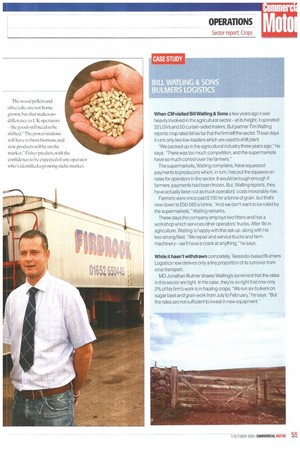BILL WAILING BULMERS LOGISTICS
Page 55

If you've noticed an error in this article please click here to report it so we can fix it.
When CMvisited Bill Walling & Sons a few years ago it was heavily involved in the agricultural sector -at its height, it operated 32 LGVs and 50 curtain-sided trailers. But partner Tim Watling reports crop rates fell so far that the firm left the sector These days it runs only two low-loaders which are used to shift plant.
"We packed up in the agricultural industry three years ago," he says. "There was too much competition, and the supermarkets have so much control over the farmers."
The supermarkets, Watling complains, have squeezed payments to producers which, in turn, has put the squeeze on rates for operators in the sector. It would be tough enough if farmers payments had been frozen. But, Watling reports, they have actually been cut as truck operators' costs inexorably rise.
Farmers were once paid £100 for a tonne of grain, but that's now down to £50-£60 a tonne. "And we don't want to be ruled by the supermarkets," Watling remarks.
These days the company employs two fitters and has a workshop which services other operators' trucks. After life in agriculture, Watling is happy with this set-up, along with his two-strong fleet. "We repair and service trucks and farm machinerywe'll have a crack at anything," he says.
While it hasn't withdrawn completely, Teesside-based BuIrners Logistics now derives only a tiny proportion of its turnover from crop transport.
MD Jonathan Bulmer shares Watling's sentiment that the rates in this sector are tight. In his case, they're so tight that now only 2% of his firm's work is in hauling crops. "We run six bulkers on sugar beet and grain work from July to February," he says. "But the rates are not sufficient to invest in new equipment."
























































































































































































